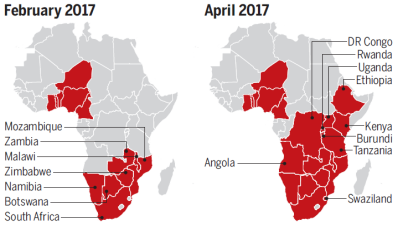Armyworm invasion continues: Crop-eating pest has now plagued 20 African countries
Government working to contain crop-eating caterpillar that arrived for the first time in Africa in 2016.
Ghana is the latest country in Africa to experience an invasion of a crop-eating pest known as "fall armyworm" (FAW). The country's Agriculture Minister asked parliament earlier in May to declare a state of emergency as the invasion is threatening a $133m (£102m, €121m) project, meant to boost the country's food production and create jobs in the agriculture sector, according to reports.
Armyworms are caterpillars native to North and South America. They were first recorded as an invasive species in Africa in early 2016. Their name derives from their eating habit, as they march through crops devastating entire harvests.
In February, the UN Food and Agriculture Organisation (FAO) held an emergency meeting over the invasion, fearing that the number of countries affected would increase.
The number of African countries that have been invaded stands now at 20, with experts warning the armyworm would cause damage worth about $3bn to Africa's maize crop in the next 12 months.
Armyworms are known for eating cereals, particularly maize and rye, staple foods in many of the impacted nations in Africa. However, Sina Luchen, Agronomist at the Southern Africa section of FAO , told IBTimes UK the pest feeds on about 80 types of crops including cotton, sweet potato, beans, banana and cucumber.
Armyworms are difficult to track and eliminate because they eat during the night, while they hide during the day. Governments in Africa have no previous experience of dealing with this type of pest.
"It is not yet clear how the pest came to Africa. It is possible that it came through agricultural commodities or perhaps through wind drift as the pest is a good flier," Luchen explained. "As an immediate emergency response to save crops from the pest, governments in affected countries supported farmers with pest pesticides, spray and safety gear. "
Most of the nations affected by the pest – particularly in Southern and East Africa – are already coping with food scarcity due to a drought that began in 2015.

Thousands of households have seen their harvests depleted due to lack of rainfalls for two consecutive seasons.
The drought has been linked to warm water in the Pacific Ocean, a phenomenon known as El Nino, exacerbated by climate change.
"There is concern about the possible multiplier effect that the pest could have on the food security of vulnerable people," Luchen said. "Some impact assessment is underway to determine the impact of the pest on households."
Luchen further explained that FAO and partners are working with governments to increase awareness on the pest and develop strategies to effectively tackle the invasion. Initiatives include the use of environmentally-friendly strategies, the use of bio-pesticides, farmer awareness and training.
However, she added, lack of resources could hinder the development of projects aimed at tackling the invasion.
Experts who took part at a conference on armyworms in Nairobi in April said countries in Africa could learn from Brazil, which has also been coping with the pest. The Southern American country is believed to spend $600m annually to contain the invasion.
© Copyright IBTimes 2025. All rights reserved.






















